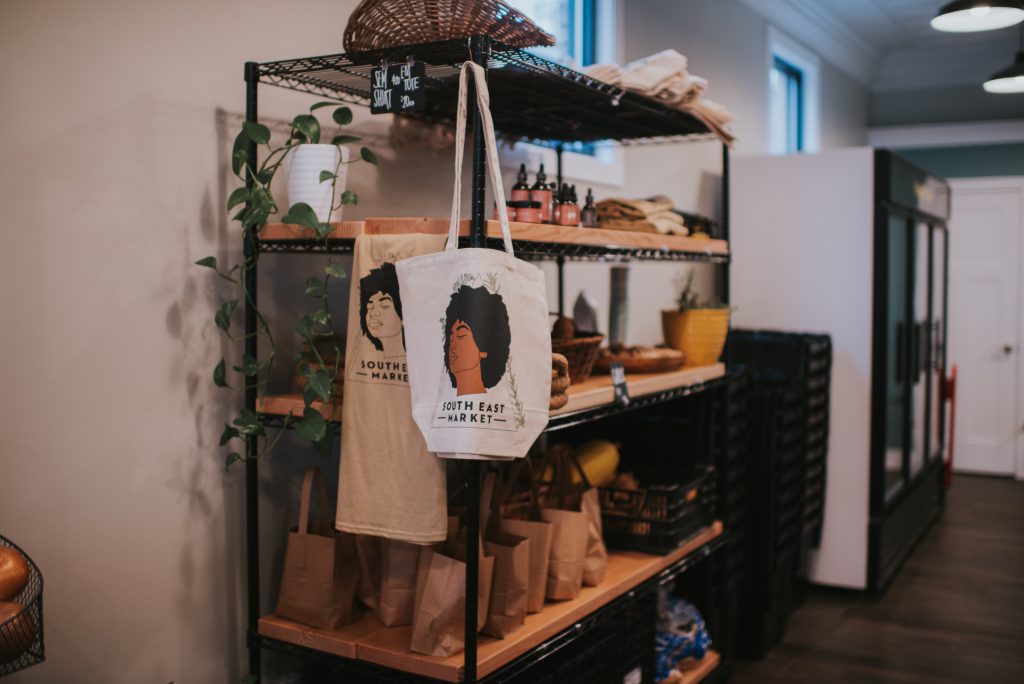
The South East Market sits just a short distance from the intersection of Kalamazoo Avenue and Hall Street on the southeast side of Grand Rapids, at 1220 Kalamazoo Ave. SE. The narrow brick storefront with two large windows and a red book cart out front labeled “free books” could easily be missed by someone walking by. It’s an unexpected find along this small stretch of roadway, with a run-down liquor store on one side and a row of homes on the other, but what this storefront lacks in space it makes up for in ambition.
The South East Market is looking to not just feed its surrounding community but improve the health outcomes of its neighbors along the way.
To understand the origins of the South East Market and its vision, you must go back several years to Alita Kelly’s experience with pregnancy.
“When I was 20 years old, I gave birth to my daughter Willow, and during that time I had preeclampsia, which is pregnancy-induced hypertension or high blood pressure, pretty much,” Kelly explained.
Unfortunately, her doctors did not catch the symptoms during her pregnancy and Kelly found herself in the hospital giving birth when things began to get scary.
“I was put on stroke watch and heart attack watch because my blood pressure was so out of control,” Kelly said.
Kelly was being fed from the hospital’s heart-healthy menu, but she said seeing items like mac and cheese and a burger among the listings was also concerning. “They were feeding me from this heart-healthy menu at the hospital and I was alarmed with what was on it,” she said.
The situation was a wake-up call for Kelly, who said she’d had no prior health issues aside from childhood obesity — and very little understanding of nutrition either. Kelly had a lot of thoughts racing through her mind during that scary time.
“Having the understanding that I could stroke out or have a heart attack and wondering who is going to care for my baby? How did we get here? And what am I going to feed this little human? So, after having that traumatic experience in the hospital, that is when I started to do some research.”
And the findings were grim.

By the numbers
According to a Centers for Disease Control and Prevention study conducted from 2007-2016, Black women are two to three times more likely to die from pregnancy-related causes than white women, and cardiomyopathy, thrombotic pulmonary embolism, and hypertensive disorders of pregnancy contributed more to pregnancy-related deaths among Black women than among white women. Other recent studies have reported Black women are up to four times more likely to die from pregnancy-related health issues than their white counterparts.
Diet plays a big part in these differences.
An article published in Science Daily in March 2017 that looked at a study published in the Journal of the Academy of Nutrition and Dietetics and led by the University of Pittsburgh Graduate School of Public Health noted that “healthy maternal diets have been linked to reduced risks of preterm birth, fetal growth restriction, preeclampsia and maternal obesity.”
The study found that none of the women in any racial and socioeconomic group evaluated achieved recommendations set forth by the Dietary Guidelines for Americans, but that Black, Hispanic and less-educated women consume a less nutritious diet than their better-educated, white counterparts in the weeks leading up to their first pregnancy.
The article quotes lead author Lisa Bodnar, Ph.D., M.P.H., R.D., associate professor and vice chair of research in Pitt Public Health’s Department of Epidemiology: “While attention should be given to improving nutritional counseling at doctor appointments, overarching societal and policy changes that help women to make healthy dietary choices may be more effective and efficient.”
Black Americans face health disparities beyond pregnancy as well, including higher rates of obesity, hypertension, diabetes, childhood asthma and more due to myriad reasons.
“I’ve had so many family members experience issues around diabetes or heart disease, and so, seeing the connection that this isn’t something that just happened to me, but it’s something that is likely to happen to my daughter and continue in my community if we don’t do something,” Kelly said.
In addition to learning about the disparities Black women face during pregnancy and in general when they interact with health care providers and systems, Kelly also began to learn about how better nutrition could have helped her.
“I realized I’m one of many that have these really tough experiences and having a sound nutrition plan would have been one way for me to protect myself against having to operate within a medical system that, quite frankly, hasn’t done a good job of caring for us.”

Changing course
Kelly began training as a dietician, which led her to jobs with Access of West Michigan and D.A. Blodgett St. John’s Home — managing nutrition programs.
“In both spaces I was the first to hold the position, so I had a lot of autonomy and creativity as far as how to execute,” she said. “And that was really fun for me, and I was successful in both of those roles and growing nutritional quality for both programs.”
While in these positions, though, Kelly became aware of another big problem — food waste. “I was able to see all of the food waste that is happening at the institutional level. It really broke my heart. Within the context of learning more about climate change and the dire situation we are in as earthlings, I decided to switch my focus not just on health and wellness of people but of the earth as a whole. So, now I work within the intersection of climate justice and food issues.”
“So, at the core of our mission at South East Market, and our understanding and philosophy, is
we understand that food is medicine.”
— Alita Kelly
Kelly attended the University of Michigan’s Environmental Science program, earning her degree this past May. Her graduation coincided with the onset of COVID-19, which was hitting Black and brown communities the hardest.
Again, Kelly could see how early nutrition could have helped communities of color lower their risk factors for becoming victims of COVID-19. She realized a preventive approach through using food as medicine could make a big impact.
“So, at the core of our mission at South East Market, and our understanding and philosophy, is we understand that food is medicine,” Kelly said. “What we are doing at South East Market is we are trying to encourage people to view food as medicine.”
Kelly has been working to open the doors of the South East Market for several months now. In October, the market began a partnership with 30 families who agreed to spend $50 every week from October through December at the store.
“These 30 customers are providing patience for us as we figure out how to run a grocery store,” Kelly said. “We are working with them and they are giving us a lot of feedback. We are providing these collections of food called produce bundles. It’s curated produce boxes, mostly working with local farms and seasonal food, and they spend $30 for a produce bundle every week and they can supplement that with additional things — meats, cheeses, milk, breads, chips, salsa, etc.”

Financing healthy outcomes
At the time of our conversation, Kelly was hoping to be able to officially open the doors of the South East Market by January, but she said it was all dependent on the store’s approval to accept EBT and SNAP transactions.
Kelly said bad health outcomes are not just a part of not having access to healthy food, but also due to not being able to afford those foods.
“Even when there has been access to healthy food in areas that experience health issues or dietary related issues at disproportionate rates, there is this other issue we can’t forget to talk about and it’s the financial challenges these communities are experiencing,” she said. “So, we have to talk about access and affordability if we are really going to talk about how to empower people to be healthy and well.”
Once the store is fully open to the public, it will operate like any other small-scale market with a wide selection of produce and shelf-stable items. Right now, the 700-square-foot store includes two refrigerators and a freezer stocked with items as well as wooden shelves piled with canned goods and more. Chalkboards with handwritten prices and product names abound throughout the store and it’s been fully renovated so everything looks fresh and new.

Supporting Black-owned businesses
Kelly said one thing that sets South East Market apart from other markets is that
the store focuses on procuring items from minority and women farmers and food makers.
“If there is kale in the store, and there is kale that a Black farmer is selling, we’re going to buy that kale first,” she said. “Sometimes that is not the most convenient thing to do. We are going out of our way to support those farms.”
Kelly notes that Black farms make up a shrinking percentage of the farms across the country. “At the beginning of the 1900s, it was one in seven farmers was a Black farmer, and now, 1.3% of farmers are farmers of color, from a leadership standpoint.”
In Michigan, Black farmers make up a very small portion of the farms and most of them are located in the Detroit area.
One local Black-owned farm is Groundswell Community Farm, a 7-acre farm located in Zeeland. The farm was started by Bruce Michael Wilson in 2006 and has been a USDA Certified Organic farm since 2009.
“As a grower, we raise 200 different varieties of 40 different vegetables,” Wilson said. “Our produce is distributed all throughout Ottawa and Kent counties.”
Wilson is committed to helping provide food for the community — and specifically communities of color.
“It might be one of the single most important efforts that farmers like me have ever embarked upon,” he said. “A real crisis is upon us. As Black people, if we do not take it seriously, our very existence could be in jeopardy. Food shortages and nutrient-inefficient foods threatened already disenfranchised communities. There was a time when Black communities owned their own land and raised their own crops, but that time has long passed over 100 years ago. Land ownership is vitally important. Re-educating ourselves on what our ancestors taught us about the value of the land and growing on the land is paramount. The importance of growing and eating organically cannot be overstated.”
Wilson said South East Market is already having a positive impact on his farm and praised Kelly for her “trailblazing” work.
“In just a few short weeks and the start of her soft opening she has improved my farm’s bottom line,” he said. “How many people do you know that can pull off such a remarkable feat with such a profound message in a few short months by getting an actual grocery store up and going in an unlikely neighborhood?”

Future expansion
Even as she is preparing to open the South East Market, Kelly also is preparing to expand. “In the next year, we will be moving to a larger space,” she said. The space will allow Kelly to provide even more grocery offerings, as well as a commercial kitchen and space for food entrepreneurs.
She hopes to use the additional space to help introduce the community to produce they may not be familiar with and to turn would-be food waste into prepared meals. She also will work with food entrepreneurs by offering them opportunities to get their products into the hands of shoppers.
Right now, Kelly is looking for additional investors to help her fully realize her dreams for the South East Market.
In the long-term, she hopes the South East Market can play a part in changing the nutritional foundation of the community in which she lives and, in turn, have an impact on the rates of disease within the community and improve the neighborhood’s health outcomes.
“We want to share with our community that prevention isn’t just for rich people that have all the grocery stores in the world, it is attainable for our community as well and it starts with us,” she said. “As someone who lives here … my family is included in those stats, so I feel passionate about it. I don’t want to be a part of those numbers and I don’t want my neighbors to be a part of those numbers. I felt like I had the responsibility because of my privilege and education and social capital to carry out this project.”
This story can be found in the February 2021 issue of Grand Rapids Magazine. To get more stories like this delivered to your mailbox each month, subscribe here.







Facebook Comments